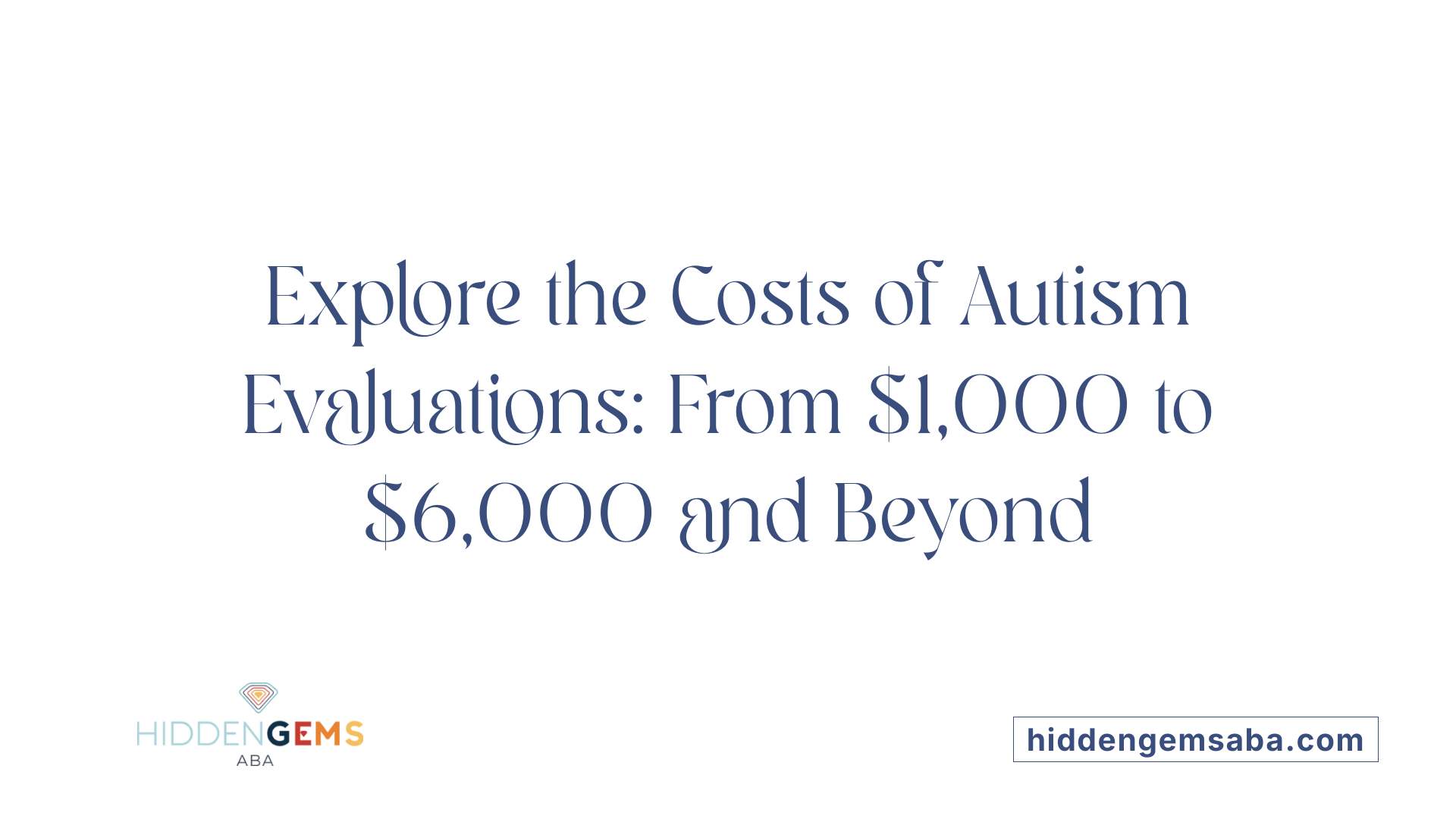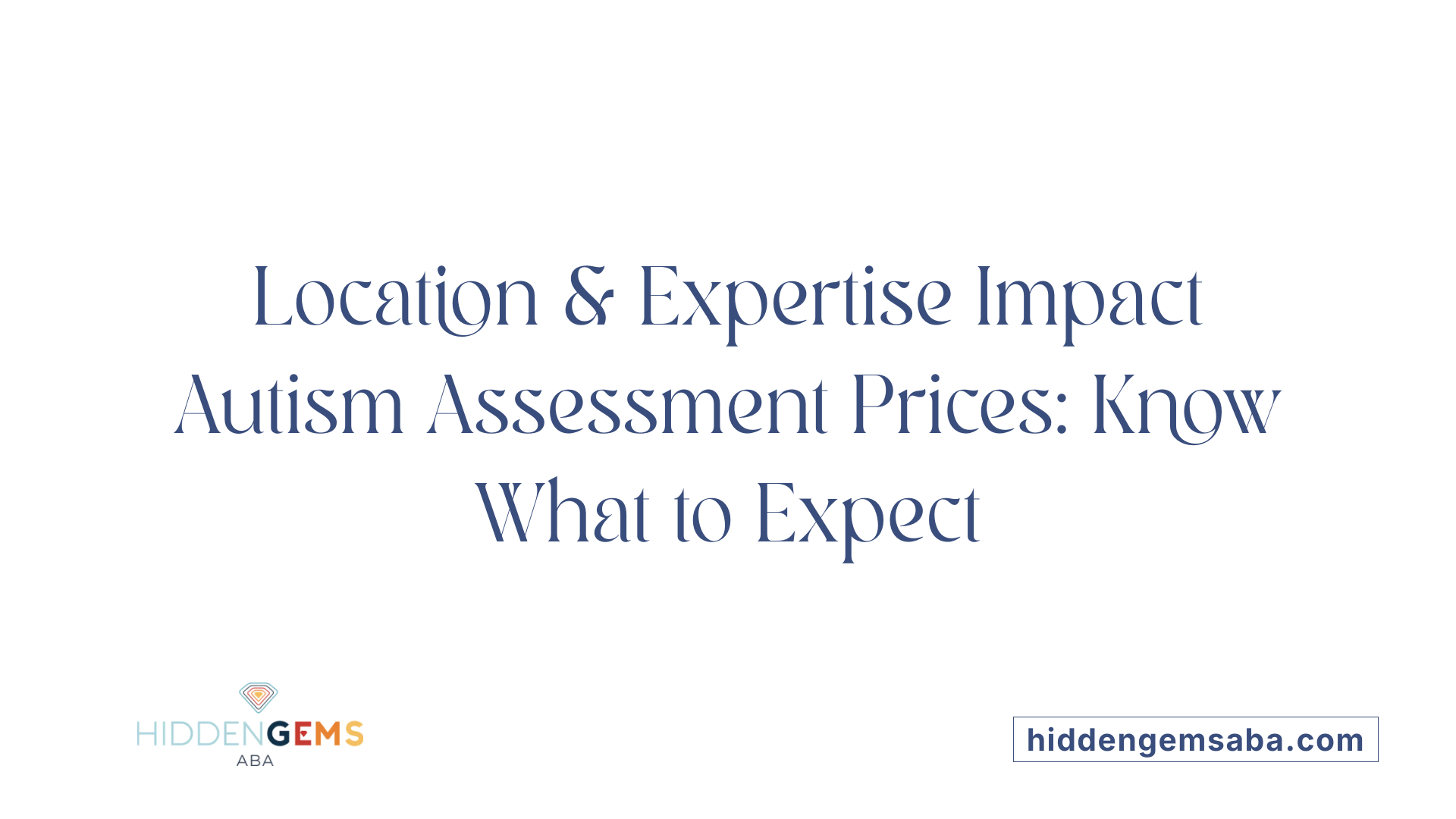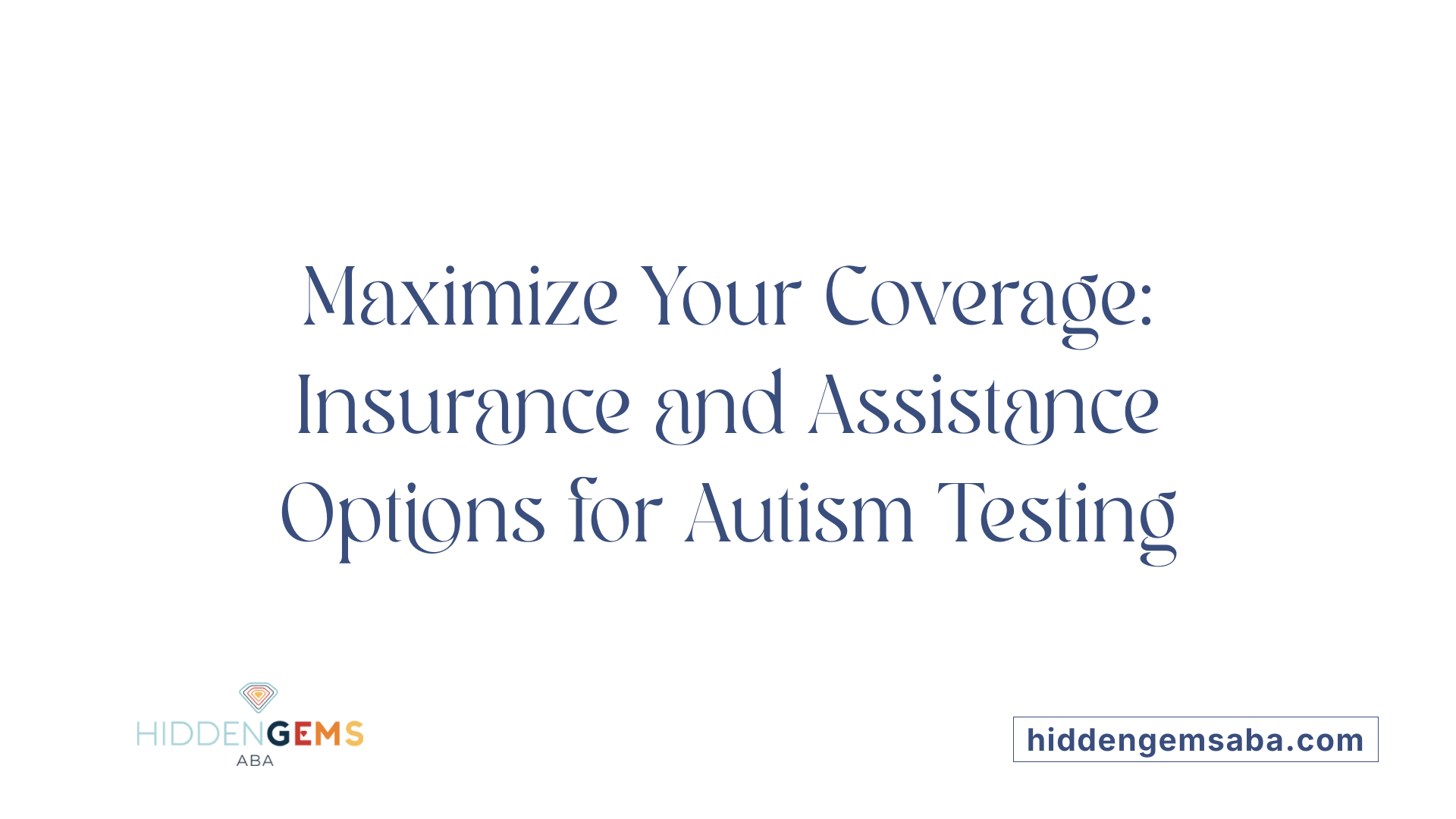Understanding the Costs and Coverage of Autism Evaluations
Autism evaluations are a critical step in understanding developmental and neurological differences. However, the costs associated with diagnosing autism can vary widely based on numerous factors including location, provider type, and insurance coverage. This article explores the typical expenses involved in autism assessments, the role of insurance, and tips for budgeting and accessing affordable services.
Range and Types of Autism Evaluation Costs

How much does an autism evaluation cost?
The expenses for autism assessments vary widely depending on the type and location of the evaluation. In California, a typical diagnostic evaluation generally costs between $1,000 and $3,000. Developmental evaluations tend to fall within the range of $1,500 to $4,000. For adults, the cost can be higher, typically ranging from $1,000 to $5,000, depending on provider and geographic location.
In urban areas such as Los Angeles and San Francisco, prices are often at the higher end due to increased demand and higher operational costs. For example, comprehensive evaluations at specialized clinics like Autism Speaks at UCLA can reach $5,000 to $6,000, while some clinics offer more affordable fixed packages, sometimes as low as $1,000 to $1,500.
What does the process of an autism assessment involve?
Assessments usually involve a detailed review of developmental history, behavior observations, and standardized testing. During the process, clinicians interview caregivers or the individual directly to gather information on behaviors, strengths, and challenges.
Key assessment components include behavioral observations in different settings, cognitive testing, and social communication evaluations, often utilizing tools such as the Autism Diagnostic Observation Schedule (ADOS) and Autism Diagnostic Interview-Revised (ADI-R). Additional screening tools like the M-CHAT are used for early detection.
Physical examinations or genetic tests may also be part of the evaluation to rule out other conditions. The professionals compile all the data to determine whether the individual meets criteria for autism spectrum disorder and discuss their findings in detailed reports. These reports often include recommendations for interventions and support services.
Why are autism assessments often expensive?
The high cost of autism assessments stems from their comprehensive nature. Specialized professionals, such as psychologists and neuropsychologists, conduct these assessments, which require extensive training and use of specialized tools.
The evaluation process can take several hours spread over multiple appointments, involving in-depth interviews, behavioral observations, and standardized testing, all of which increase the overall expense. The use of proprietary tools like the ADOS and ADI-R further adds to costs, as they are expensive to administer and interpret.
Moreover, the need for accurate diagnosis to access essential services heightens the importance of thorough evaluations, which naturally entail higher costs. Geographic location plays a role too, with prices being higher in urban centers versus rural areas.
How much does an autism evaluation cost with insurance?
Insurance can significantly reduce out-of-pocket expenses, although coverage varies. Many private insurers, Medicaid, and state programs cover a substantial portion of the cost, especially if the evaluation is deemed medically necessary.
Typically, families may pay copayments or coinsurance fees ranging from $20 to $100, or a percentage of the total cost. For example, a full assessment costing $3,000 might require a family to pay 10-20%, depending on their insurance plan.
It's essential to verify coverage details beforehand. Providers often assist families in navigating pre-authorization and in-network options to minimize costs. Several community resources and clinics also offer free or low-cost evaluations for eligible individuals, including some public school and university-based programs.
| Evaluation Type | Typical Cost Range | Notes |
|---|---|---|
| Diagnostic evaluation | $1,000 - $3,000 | Includes behavior assessment, interviews, testing |
| Developmental evaluation | $1,500 - $4,000 | Broader evaluation of developmental milestones |
| Comprehensive assessment | $2,500 - $5,000 | In-depth testing for complex cases |
| Adult autism assessment | $615 - $6,000 | Includes clinical interviews and standardized tests |
| Telehealth evaluations | $150 - $1,500 per session | Generally more affordable, varies widely |
Understanding the costs associated with autism evaluations can help families better plan financially. Insurance and low-cost community resources are valuable avenues to reduce expenses and ensure access to essential diagnostic services.
Factors Influencing Diagnostic Costs and How Location Matters

Why are autism assessments often expensive?
Autism assessments tend to carry high costs because they are thorough and time-consuming processes. These evaluations involve detailed interviews, developmental screenings, behavioral observations, and standardized testing, all conducted by trained professionals such as psychologists, developmental pediatricians, or neuropsychologists. The use of specialized tools like the Autism Diagnostic Observation Schedule (ADOS) and the need for accurate interpretation add to the expense.
Typically, an evaluation can take several hours over multiple appointments, increasing the overall cost. Expenses often range from $1,000 to $5,000 or higher, mainly influenced by geographic location and the credentials of the provider. Insurance coverage varies widely, but many families pay out-of-pocket costs, especially in areas with limited provider options or high demand. The importance of a precise diagnosis for accessing targeted interventions makes these assessments a critical investment despite their expense.
How does geographic location affect the cost of autism evaluations?
Location plays a significant role in the pricing of autism assessments. Urban centers like Los Angeles and San Francisco tend to have the highest fees, sometimes reaching up to $10,000 for comprehensive evaluations. These cities often have a high concentration of specialists and elevated living costs, which contribute to the higher prices.
In contrast, regions like Texas or less densely populated areas in California often see lower costs, with evaluations available in the range of $1,200 to $3,000. For example, case studies show that costs can be around $3,000 in New York City, $2,500 in California, and only approximately $1,200 in Texas. The availability of providers, local demand, and competition influence these regional price differences.
What role do professional expertise and assessment types play in costs?
The type of professional conducting the assessment and the scope of the evaluation significantly affect the price. Psychologists generally charge between $2,500 and $6,000, developmental pediatricians from $2,000 to $5,000, and psychiatrists from $3,000 to $5,000. Neuropsychologists often charge from $3,000 up to $9,000 for more detailed and extensive testing.
More comprehensive assessments that include neuropsychological testing tend to be on the higher end of the cost spectrum. The specific assessment tools used, such as the ADOS-2, and whether the evaluation is broad or targeted, also impact overall expenses. Packages offering full evaluations might range from $1,500 to $5,000, with some providers offering fixed rates or bundled assessment deals.
| Aspect | Cost Range | Additional Notes |
|---|---|---|
| Psychologists | $2,500 – $6,000 | Usually include behavioral assessments and interviews |
| Developmental Pediatricians | $2,000 – $5,000 | Focused on developmental history and clinical exam |
| Psychiatrists | $3,000 – $5,000 | May include medication management as well |
| Neuropsychologists | $3,000 – $9,000 | Extensive testing for complex cases |
| Assessment Tool Examples | $200 – $1,500+ | ADOS, cognitive tests, social-emotional evaluations |
Understanding these factors helps families estimate potential costs, determine suitable providers, and explore insurance options or assistance programs. Given the wide variation, consulting multiple providers and verifying insurance benefits beforehand can help manage expenses effectively.
Insurance Coverage and Financial Assistance Options

Does insurance typically cover autism testing for children and adults?
Coverage for autism testing can differ widely depending on the insurer and the specific health insurance plan. Generally, many health insurance policies are mandated to cover autism diagnosis and related treatments, including assessments for both children and adults. For children, early diagnosis often involves developmental screenings and comprehensive evaluations, which are usually covered under most insurance plans.
When it comes to adults, insurance coverage can be less consistent but is often available if the assessment is deemed medically necessary. Some plans include autism testing and therapies, especially when diagnostic results can lead to treatment or support services.
It’s important for families and individuals to review their insurance policies carefully or contact their insurance providers directly to confirm the specifics of coverage for autism testing. Benefits and coverage amounts can vary, and understanding these details helps in planning and avoiding unexpected costs.
What options are available for financial assistance and reducing out-of-pocket costs?
Many families face financial challenges when seeking autism evaluations. Fortunately, several support options can help reduce expenses. Medicaid and state assistance programs are significant resources that can cover the entire cost of evaluations or offer subsidies, especially for eligible children.
Nonprofit organizations and regional centers also provide valuable services, including grants and free evaluations, particularly for young children. These organizations often target underserved populations, ensuring early diagnosis and intervention.
In addition, in-home support programs, SSI (Supplemental Security Income), and scholarships based on socioeconomic status can assist with costs. Some providers accept insurance, which significantly lowers out-of-pocket expenses. Others offer sliding scale fees or reduced rates based on income, making assessments more accessible.
Potential financial aid options include:
- Medicaid and state-funded programs
- Community grants and nonprofit support
- Regional centers with no-cost or low-cost services
- Scholarships for low-income families
- Sliding scale payment arrangements
By exploring these resources, families can find the support they need while managing the financial impact of autism evaluations.
Overview of Costs and Assistance Programs
| Support Type | Coverage / Assistance Details | Additional Notes |
|---|---|---|
| Insurance Plans | Varies, often covers diagnosis and treatment; check policies | Coverage can include copays, coinsurance, or full payment |
| Medicaid & State Programs | May cover full cost or provide subsidies | Eligibility varies by state and income levels |
| Nonprofit & Regional Centers | Grants, free evaluations, or reduced costs | Focus on underserved communities |
| In-home Support & SSI | Financial support for ongoing services | Usually based on eligibility and need |
| Scholarships & Sliding Scale | Reduced fees or scholarships, based on socioeconomic factors | Apply through providers or support organizations |
Final notes
Families and individuals interested in autism testing should verify insurance benefits in advance. Many providers will inform clients of their coverage and any potential out-of-pocket costs beforehand. When insurance isn't sufficient, exploring available financial aid programs becomes crucial. These resources help ensure thorough evaluation for those who need it while easing the financial burdens often associated with diagnostic processes.
Always consult with healthcare providers and local support agencies to stay informed about the latest assistance options tailored to your situation.
Special Considerations for Adults and Unique Evaluation Aspects

How much does an autism evaluation cost in adults?
The price for an adult autism assessment varies depending on the provider and scope of testing. Typically, a standard adult evaluation costs around $615. However, more comprehensive assessments, which might include detailed interviews, psychological testing, and observation, can reach up to $6,000. Many adult assessments are designed to be shorter and more targeted compared to those for children, focusing on traits that manifest in adult social behaviors, sensory processing, and behavioral patterns.
What are the specific considerations when diagnosing autism in adults?
Diagnosing autism in adults involves several unique challenges and considerations. Many adults seeking diagnosis were not diagnosed during childhood, so the process often relies on reviewing historical information alongside current functioning. The assessment primarily examines social communication skills, behavioral patterns, and sensory processing issues.
Since comprehensive neuropsychological testing is less common in adult evaluations, assessments tend to be shorter — usually around three hours — and involve structured interviews conducted by psychologists or psychiatrists. Screening for co-occurring conditions such as depression, anxiety, and ADHD is a typical part of the process, as these can influence behavior and may mimic or mask autism symptoms.
While adult diagnosis can bring clarity, it may also open doors to workplace accommodations and support services. However, availability of insurance coverage and community resources can be more limited for adults compared to children. Therefore, understanding the specific evaluation process and potential benefits is vital for adults seeking an autism diagnosis.
Are there unique evaluation tools or procedures for adult autism diagnosis?
Yes, adult autism assessments often utilize tailored tools and procedures that distinguish them from childhood evaluations. Given that adults may present different manifestations of autism, assessments are designed to be shorter and more focused.
Typically, adult evaluations avoid the extensive neuropsychological testing common in pediatric assessments. Instead, they employ specific questionnaires and structured interviews targeted at identifying traits relevant to adult social behavior, sensory experiences, and communication patterns.
For example, evaluation tools may include self-report questionnaires, observation checklists, and clinical interviews. These instruments aim to highlight features that influence adult functioning and social interactions.
This streamlined approach helps clinicians concentrate on the core characteristics of autism that are most relevant in adulthood, providing a clearer diagnosis while reducing assessment length and complexity.
Making Autism Assessment More Accessible
While autism evaluations can be a significant financial investment, understanding the factors affecting costs and the available resources can make the process more manageable. Insurance coverage, regional differences, and affordable community programs play vital roles in making diagnosis accessible. Planning carefully, verifying insurance benefits, and exploring financial assistance options can help families and individuals obtain crucial diagnoses without undue financial strain. Ultimately, an accurate diagnosis opens doors to tailored support, interventions, and a better understanding of oneself or loved ones, fostering greater opportunities for growth and inclusion.
References
- Understanding the Cost of an Autism Diagnosis in California
- How Much Does an Autism Evaluation Cost? See 3 Examples
- [PDF] Autism Evaluations 7 1 2025 - Family Health
- Self-Pay Adult Autism Program - Neuroaffirming Mental Health Care
- How Much Does Autism Testing Cost? - KMN Psych
- How Much Does an Autism Diagnosis Cost in Texas? - AT4K
- [PDF] fee schedule - uw autism center services



.jpg)
